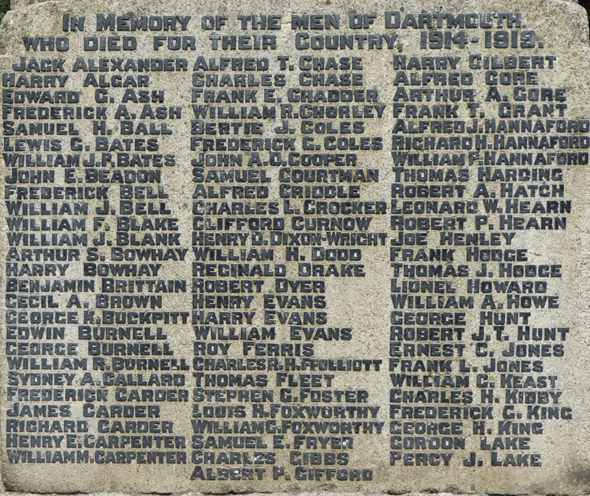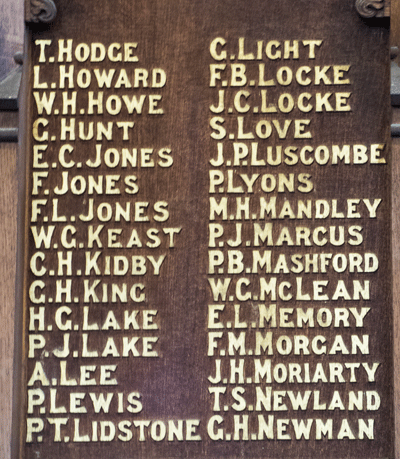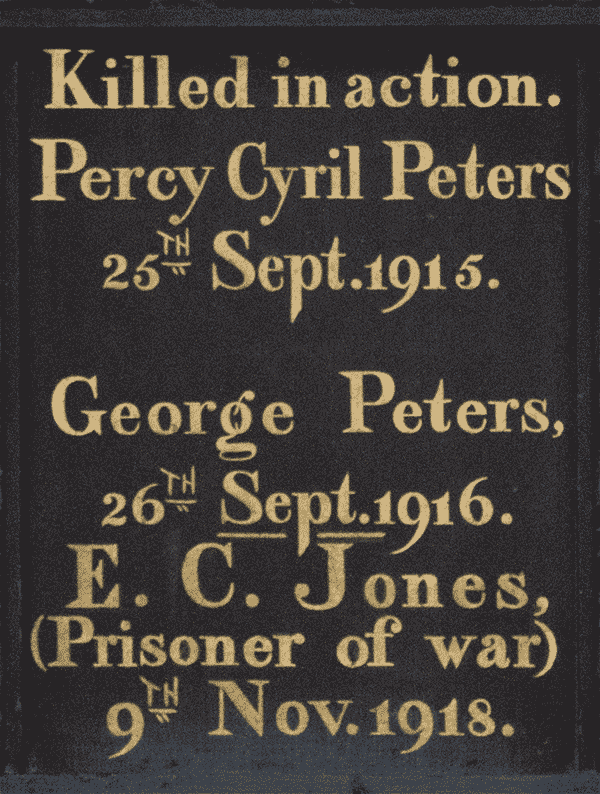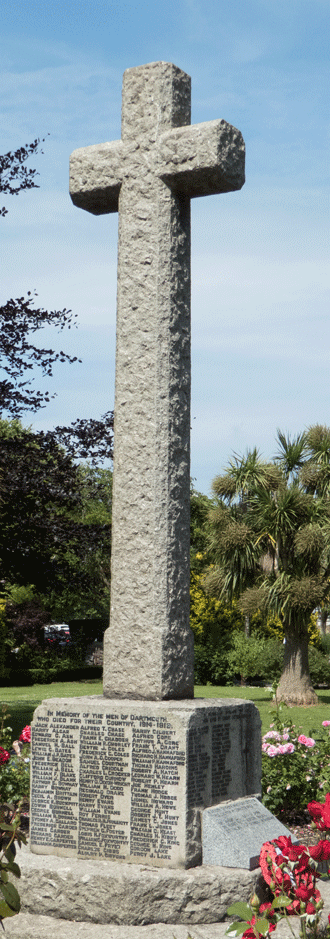Ernest Charles Jones
Family
Ernest Charles Jones was born in Dartmouth on 29 October 1895. He was the eldest son of Charles Stuart Jones (known as Stuart) and his wife Sarah Ann Bellett. Both were from Dartmouth and had married earlier that year in St Petrox.
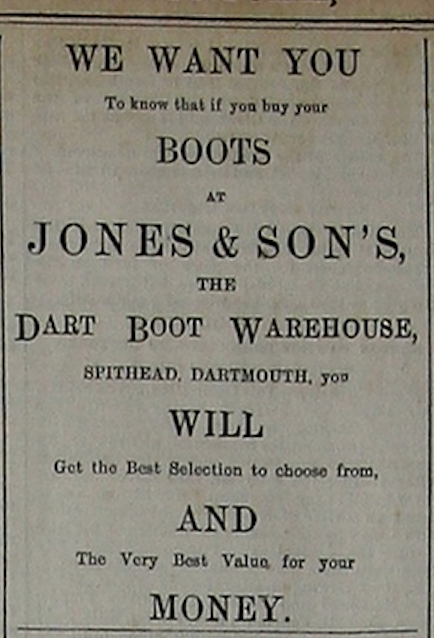
(Dartmouth History Research Group)
At the time of Ernest's birth his father was a boot and shoemaker, who worked with his father (Ernest's grandfather) George in his boot and shoemaking business, advertising frequently in the Dartmouth Chronicle.
But in 1896 George Jones was declared bankrupt. He had taken over an ironmongers business from his elder son, George junior, when it failed, and was unable to turn the business round. The Chronicle reported his testimony at the hearing (27 March 1896) "For seven years he had had nothing but calamities, over which he had had no control". He was discharged four years later "in bad health and not likely to be able to trade again, and ... living on his children" (18 May 1900).
So Stuart set up business on his own - the 1901 Census recorded him running a boot and shoe shop "on his own account" in Duke Street. By then Ernest, aged 5, had two sisters, Edith age 3 and a new baby, Elsie - sadly, another sister, Winifred, had died the previous year aged only four months. Also living with them was his maternal grandmother, Ellen Bellett.
In 1903 Stuart decided to take up a different line of work. He sold his business, the "Eclipse Boot Stores" (apparently at the corner of Duke Street and Foss Street) to a Mr J Hickey, and took over the license of the Royal Union Inn in Market Street (now the Dolphin). The pub was owned by Plymouth Breweries and so Stuart found himself frequently up before Dartmouth magistrates who objected to a lack of clarity in the lease. Nonetheless, he and his wife ran the pub for twenty years. The 1911 Census shows the family living at the Royal Union Inn; by then there were three more children, George, Doris and Leslie. Ernest, now 15, had left school and was a tailor's apprentice.
Service
Like so many of those who served in the Great War, Ernest's service papers have not survived. However, we know he was an early recruit, because his name appears on the list published in the Dartmouth Chronicle of 16 October 1914 of 27 people who were by then members of F Company, based in Dartmouth, of the 7th Battalion Devonshire Regiment (Cyclists) (indeed, he may have joined the Territorial Force before the war). For F Company's service in the early months of the war, see the stories of Frederick Thomas Bell and Harold Mandley.
As part of the Territorial Force, members of the 7th Battalion had no liability for service overseas. But with the introduction of conscription early in 1916, this restriction no longer applied. Ernest was one of around 100 men from the Devon Cyclists who volunteered to serve abroad and transferred to the Worcestershire Regiment. Several men from Dartmouth joined the 2nd/8th Battalion, and we know from surviving service papers of one of them that the transfer occurred on or around 18 May 1916. The Worcestershire Regiment service numbers of Dartmouth men who are known to have transferred are all close, indicating that they transferred at the same time:
- Gordon Lake: 5513
- Percival Pepperell (see further below): 5526
- Ernest Jones: 5536
- Joseph Henley: 5537
- Frederick Coles: 5539
- Patrick Lyons: 5568
- Frederick Lake (brother of Gordon): 5569
Ernest therefore presumably arrived in France with the rest of the battalion on 25 May 1916. For their early experiences see the stories of Joseph Henley, Frederick Coles and Patrick Lyons - Joseph Henley was wounded during June, and transferred elsewhere most probably after he had recovered; Frederick Coles was transferred on 3 August; and Patrick Lyons was killed while on a trench raid on 7 August 1916. For the battalion's experiences during most of 1917, see the story of Gordon Lake, who died of his wounds following the Battle of Cambrai, most probably in a German medical station on 5 December 1917.
The Battalion's War Diary for 1918 begins on 1 February, when they were "working in battle zone". A major German offensive was expected in the spring, so the British were attempting as rapidly as possible to create "defence in depth" along their whole front - the Battle Zone (as its name implies) was the area where the main part of the fighting was expected to take place, behind the "Forward Zone". For further details see the story of Reginald Drake. 61st Division's sector was north-west of St Quentin, with 182nd Brigade to the right of the divisional front.
During February and March they alternated between Battle Zone and Forward Zone. On 12th March the work included installing Livens Gas Projectors, which a few days later when exploding prematurely "slightly gassed some of our men". But as the days ticked past the entries read simply, "Enemy quiet" or "very quiet".
At 4.40am on 21 March things suddenly changed - the "Kaiserschlacht" - the long awaited German offensive - had begun. By misfortune, the 2/8th Worcestershires were allocated to the Forward Zone holding a series of posts between Roses Wood in the south and the edge of the village of Fayet to the north. Battalion HQ was in the recently constructed Ellis Redoubt, which was still incomplete and not yet fully fortified. The War Diary's account, though extremely terse, still provides some feel for the impact of the attack, as one by one the forward posts were surrounded and fell, leaving only the garrison in the Ellis Redoubt to attempt to stem the tide:
"4.40am Enemy started intense bombardment of our line with 5.9s and trench mortars. Gas shells used in Selency Valley against Ellis Redoubt. Morning very thick mist, mild & still"
"2.30pm Reports received at Brigade HQ from time to time of fighting in the whole forward zone. At 2.30pm the last messenger that got away from Ellis Redoubt reports garrison completely surrounded.
"5pm One officer & 10 OR returned from line of resistance and report enemy in large numbers in all forward zone. Ellis Redoubt surrounded but still fighting. No one returned from forward zone after this time ...
"7.30pm Sent patrol to endeavour to get to Ellis Redoubt. They failed to do so as the enemy were assembling in large numbers along the whole Savy-Holnon road. There was no sign of fighting in the forward zone ..."
There follows in the War Diary a long list of missing officers, concluding with the bleak statement: "Missing 566 OR". As this indicates, the forward zone had been completely overcome. Amongst the many taken prisoner were Ernest and his friend Percy Pepperell. According to the prisoner of war registers held by the International Committee of the Red Cross (ICRC), Ernest was captured in Fayet, and Percy was taken apparently in a more forward position, probably on the Outpost Line, as his place of capture was said to have been St Quentin. Neither was wounded.
The first news of what had happened to them reached Dartmouth several weeks later - as the Dartmouth Chronicle reported on 29 April 1918:
Dartmouth Prisoners of War
Three More in German hands
This week news has been received of three young Dartmothians who have had the misfortune to be in the hands of the Germans. All three have been missing since March 21st, the date of the great Hun offensive. Two of them are the sons of Mr P H Pepperell, tailor and costumier, of Higher Street. The oldest, Private Percival Pepperell, was in the Signal Section of the 2/8th Worcesters, and is 25 years of age. His brother, Lance Corporal Allen Pepperell, who is 23 years of age, was with the Royal Engineers, and last Sunday a postcard was received from him stating that he was a prisoner at Limburg and unwounded. Following this, and on Wednesday morning last, a postcard was also received from the other brother stating that he also is unwounded and a prisoner of war in another German camp.
The third is Private Ernest Charles Jones, son of Mr and Mrs C S Jones, of the Union Inn, Market Square. He and Percy Pepperell, both in the 2/8th Worcesters, were taken prisoner together and they are still together in the same camp. A postcard received from him on Wednesday morning last states that he has a comfortable billet in camp there, and he hopes to be back in England again before the end of the present year.
One estimate is that around 21,000 British prisoners were taken on the day that Ernest and Percy were captured, and the huge number captured in such a short time overwhelmed the ability of the German army to cope. Unwounded men, such as Ernest and Percy, were usually held in newly created labour camps for work behind the lines; but they were luckier than many, for evidently they did receive the standard field service postcard by which a prisoner was able to let his family know what had happened to him; and by which his family would know where they could send letters or food parcels. The Chronicle report does not give the name of Ernest and Percy's camp and it is quite likely that they may have been moving between different labour camps at this stage. Despite Ernest's reported reference to a "comfortable billet", the conditions he faced are quite likely to have been extremely difficult - reports of overcrowded accommodation, malnutrition, mistreatment and violence towards prisoners from their guards are frequent.
Ernest and Percy were registered with the ICRC on 20 August 1918, and had clearly stuck together as they appear sequentially in the register. By that time they were in the Langensalza POW camp, near the small spa town of Bad Langensalza, in Thuringia, central Germany, well away from the front. Langensalza held around 10,000 prisoners from many countries, including the British empire, France, America, Russia, Serbia, Italy, Belgium, Portugal and Romania. Whilst it is possible that conditions may have improved, descriptions of Langensalza for this period refer to poor accommodation and sanitation and to lack of food, clothing and proper medical attention, other than that organised by the prisoners own "Help Committee".
Death
It seems, however, that it was not poor conditions which brought about Ernest's death whilst a prisoner of war - though they may have contributed. Instead, he was a victim of influenza, which swept through POW camps in two waves in 1918, the first from May to July, and the second in October to November, as indeed it swept through Germany and elsewhere in Europe. Prisoners of course lived in close proximity to each other and the virus also spread due to the movement of prisoners around the prison camp system. When a person developed pneumonia, prisoner mortality was around 25%.
The Western Morning News of 13 January 1919 reported the return of Percy Pepperell to his family and the sad news of his friend's death in Merseburg hospital (in Saxony Anhalt) just as the war came to an end:
Dartmouth Comrades
Mr and Mrs C S Jones, Royal Union Inn, Dartmouth, have received the news of the death of their son Pte Ernest Charles Jones, 23, on November 11 in Merseburg Hospital Germany. He was devotedly cared for by another Dartmouth soldier, Pte Percy Pepperell, son of Mr and Mrs Philip Pepperell, who arrived home this week from Germany. Both men were together throughout the war. They mobilised with the 7th Devons and went through the Whitby bombardment. With other Dartmothians they volunteered for active service with the Worcestershire R. and spent two years in France. Both were made prisoners of war at the end of last March. While in a prisoners' camp Jones contracted influenza, and was helped by Pepperell to Merseburg Hospital, some considerable distance away, where, as stated, he died.
Ernest was first buried in the Merseburg POW Cemetery; in 1922, the graves of British prisoners in Germany were brought together into four major graveyards, one of which is in Berlin. He lies now in Berlin Southwestern Cemetery.
Some confusion exists about Ernest's date of death. It will be seen that the report above gives the day as 11 November, Armistice Day itself; the Commonwealth War Graves Commission records have 9 November and that date is also recorded on the St Petrox War Memorial; while other sources such as the Soldiers Effects Register and the Territorial Force Medal Roll have 10 November.
Ernest is commemorated in Dartmouth on the Town War Memorial, the St Saviours War Memorial and the St Petrox War Memorial.
